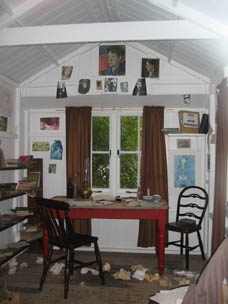Lynn Fotheringham of garden office suppliers
InsideOut Buildings (one of our listed suppliers in the lefthand column) was kind enough to send her thoughts on the issue of planning permission to this site following yesterday's post. They cover the main questions that her clients regularly ask before purchasing a garden building. Her comments are below:
Further to your concerns about planning permission for garden buildings you may find the FAQ's below useful. Also, any building used for human occupation such as an office,[but not a greenhouse or unheated workshop] with a floor space of between 15sq metres and 30sq metres, if positioned within a metre of the garden boundary also needs a full building regulations application to bring it up to the correct standards of insulation, double glazing, fireproofing etc. Any such building of more than 30sq metres needs building regulations whatever its position.There is a lot of mis-information availabwel on the internet about garden buildings and their regulation.
Puzzled By Planning Permission for Garden Offices? Here Are The Answers To The Top Ten FAQ.
1. “What type of garden building can I build without planning permission?” Many types of garden buildings, including garden offices, sheds and greenhouses don’t need planning permission under normal circumstances. However there are situations where an office in the garden, a summerhouse, pool house or even a shed needs planning permission.
2. “Under what circumstances will my office or other garden building need planning permission?” It will need PP if it falls into one or more of the following categories: - A. If you live in an AONB, Conservation Area, National Park, Norfolk Broads or a listed building you will need PP for any structure with a volume greater than 10 cubic metres. B. The building is for other than domestic use. For example, you may not need planning permission for a personal home office, but if you want an office in which you intend to employ other people you may need PP. c. If the building has a monopitch roof and is more than 3m high or a ridged roof and is more than 4m high. D. If your garden building is within 20 metres of a highway or footpath and closer to that highway or footpath than your house is. Typically this situation occurs if you live on a corner or have a lane or footpath running past the bottom of your garden. E. If more than 50% of your garden will be covered with outbuildings.
3. “I thought garden buildings were temporary buildings and hence didn’t need planning permission?” A temporary building is a building that would be in one place for less than 28 days.
4. “I thought small building such as sheds or garden offices never needed planning permission?” Planning permission is less about building size or type and more about location. See point 2, above.
5. “I think my garden building may need planning permission. Where can I get further advice?” Help and advice is available from three sources: - 1)Your local planning dept. 2)An architect. 3) A planning consultant.
6. “The company supplying me with my garden office building assures me that it will be OK if I don’t bother about planning permission. Is their word enough?” It is your responsibility as the householder to find out if PP is needed. A reputable company should be willing to make a planning application on your behalf, as part of their service.
7. “What will happen if I don’t get the correct permissions for my garden building?” Your local planning department has the power to order you to take the building down or halt the construction until PP has been obtained. A building without the appropriate permissions could cause problems if you want to sell your house.
8. “If I have to apply for planning permission will I get it?” Each case is considered on it’s own merits, but over 80% of all planning applications are approved.
9. “How long does it take to get planning permission?” All planning departments aim to determine your application within 8 weeks.
10. “ Will I have to employ a professional to fill in my application form?” Planning departments accept planning applications from householders. The Householder application form is straightforward and your planning dept. will advise you on filling it in.

